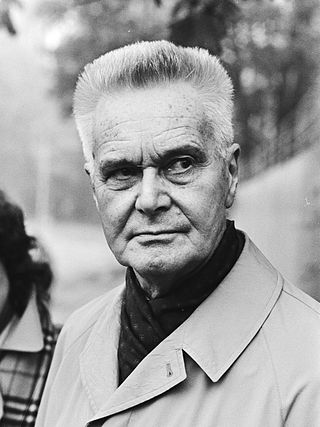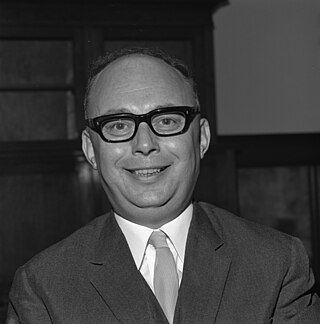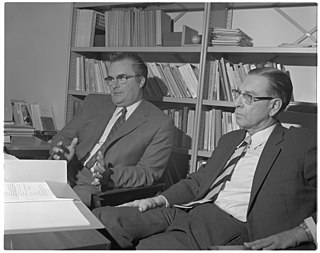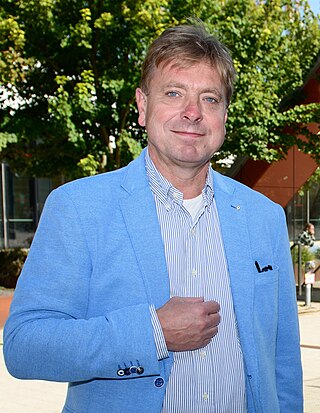Related Research Articles
Econometrics is an application of statistical methods to economic data in order to give empirical content to economic relationships. More precisely, it is "the quantitative analysis of actual economic phenomena based on the concurrent development of theory and observation, related by appropriate methods of inference." An introductory economics textbook describes econometrics as allowing economists "to sift through mountains of data to extract simple relationships." Jan Tinbergen is one of the two founding fathers of econometrics. The other, Ragnar Frisch, also coined the term in the sense in which it is used today.

Jan Tinbergen was a Dutch economist who was awarded the first Nobel Memorial Prize in Economic Sciences in 1969, which he shared with Ragnar Frisch for having developed and applied dynamic models for the analysis of economic processes. He is widely considered to be one of the most influential economists of the 20th century and one of the founding fathers of econometrics.

Erasmus University Rotterdam is a public research university located in Rotterdam, Netherlands. The university is named after Desiderius Erasmus Roterodamus, a 15th-century Christian humanist and theologian.

Henri (Hans) Theil was a Dutch econometrician and professor at the Netherlands School of Economics in Rotterdam, known for his contributions to the field of econometrics.
Arnold Zellner was an American economist and statistician specializing in the fields of Bayesian probability and econometrics. Zellner contributed pioneering work in the field of Bayesian analysis and econometric modeling.
Pieter (Piet) Rietveld was a Dutch economist and Professor in Transport Economics at the Vrije Universiteit, Amsterdam, and a fellow at the Tinbergen Institute. He was among the top researchers in economic geography according to IDEAS/RePEc.
The Tinbergen Institute is a joint institute for research and education in economics, econometrics and finance of the VU University Amsterdam, the University of Amsterdam, and the Erasmus University Rotterdam. The institute was founded in 1987 and is named after the Dutch economist Jan Tinbergen, a Nobel prize-winning professor at the Erasmus University Rotterdam.
Bayesian econometrics is a branch of econometrics which applies Bayesian principles to economic modelling. Bayesianism is based on a degree-of-belief interpretation of probability, as opposed to a relative-frequency interpretation.
Econometric Institute at the Erasmus University Rotterdam is a leading research institute in the fields of econometrics and management science in the Netherlands. The Institute offers advanced education in econometrics. It was founded in 1956 by Henri Theil in cooperation with Jan Tinbergen.

Willem Hendrik Somermeyer was a Dutch economist, Professor in Econometrics at the Erasmus University Rotterdam, and member of the Royal Netherlands Academy of Arts and Sciences, particularly known for his consumption-savings model.
Teunis (Teun) Kloek is a Dutch economist and Emeritus Professor of Econometrics at the Erasmus Universiteit Rotterdam. His research interests centered on econometric methods and their applications, especially nonparametric and robust methods in econometrics.
Harm Bart is a Dutch mathematician, economist, and Professor of Mathematics at the Erasmus University Rotterdam, particularly known for his work on "factorization problems for matrix and operator functions."
Antonius Cornelis Franciscus (Ton) Vorst is a Dutch financial engineer and mathematician, Professor at the department of Finance of the Vrije Universiteit in Amsterdam, and Director of the VU Amsterdam School of Finance and Risk Management.

Philippus Henricus Benedictus Franciscus "Philip Hans" Franses is a Dutch economist and Professor of Applied Econometrics and Marketing Research at the Erasmus University Rotterdam, and dean of the Erasmus School of Economics, especially known for his 1998 work on "Nonlinear Time Series Models in Empirical Finance."

Coenraad Nicolaas (Coen) Teulings is a Dutch economist and distinguished professor at Utrecht University. He was formerly professor of Economics at the University of Amsterdam and the University of Cambridge and former Director of the Bureau for Economic Policy Analysis, as well as Chairman of Merifin Capital.

Guido Wilhelmus Imbens is a Dutch-American economist whose research concerns econometrics and statistics. He holds the Applied Econometrics Professorship in Economics at the Stanford Graduate School of Business at Stanford University, where he has taught since 2012.
Albert Peter Marie (Albert) Wagelmans is a Dutch economist and Professor of Management Science at the Erasmus School of Economics (ESE) of the Erasmus University Rotterdam working in the fields of mathematical optimization methods for production, public transport and health care planning.
Christiaan Heij is a Dutch mathematician, an assistant professor in statistics and econometrics at the Econometric Institute at the Erasmus University Rotterdam. He is known for his work in the field of mathematical systems theory, and econometrics.
Siddhartha Chib is an econometrician and statistician, the Harry C. Hartkopf Professor of Econometrics and Statistics at Washington University in St. Louis. His work is primarily in Bayesian statistics, econometrics, and Markov chain Monte Carlo methods.

Anthony Lancaster was a British-American Bayesian econometrician. He was the Herbert H. Goldberger Professor Emeritus at Brown University and a fellow of the Econometric Society from 1991 until his death.
References
- 1 2 3 Herman K. van Dijk at few.eur.nl, 2013
- ↑ H.K. (Herman) van Dijk at erim.eur.nl. Accessed Sept 10, 2013.
- ↑ Van Dijk, (1984, Chapter 3)
- ↑ Van Dijk, Herman K., J. Peter Hop, and Adri S. Louter. "An algorithm for the computation of posterior moments and densities using simple importance sampling." The Statistician (1987): 83-90.
- 1 2 Christiaan Heij et al. (2004)
- ↑ List of publications at National Library of the Netherlands.
- ↑ Herman K. van Dijk Google Scholar profile